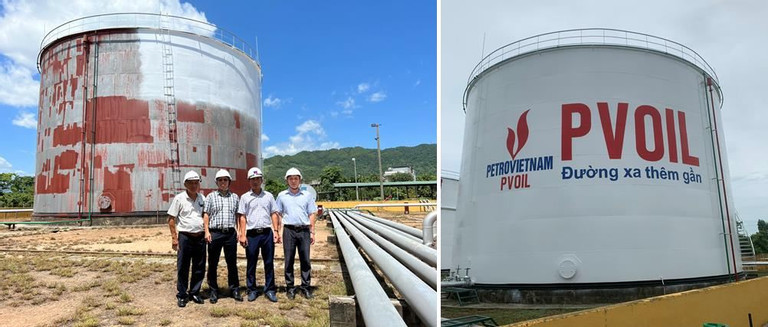
Vietnam's entire territory is located in the tropical zone. The total average annual radiation volume is high (120 kcal/cm2/year). It is hot in summer, so the intensity of direct radiation can reach a maximum of 0.6 kcal/cm2/day in June and August in the north and months of April-May, August-September in the south.
This weather conditions cause the heat island effect in the large cities of Hanoi and HCM City.
This type of weather leads to high power consumption level caused by cooling equipment, thus worsening electricity shortage. Meanwhile, petroleum distributors suffer big losses because of evaporation, and the risk of fire and explosion hangs over.
The Institute for Tropical Technology under the Vietnam Academy of Science and Technology has developed solar heat reflective paint for heat resistance for petroleum storage tanks. Solar thermal reflective coatings operate on the principle of diffuse reflection.
The heat resistance paint technology has been developed and upgraded with the focus on two major criteria – heat-reflective efficiency and weather durability.
The institute has mastered the technology of manufacturing heat-reflecting additives based with nano-sized materials. This research is applied in practice in manufacturing highly effective solar heat reflective paint.
The paint created by the institute can satisfy the strict international requirements and has quality equal to imported products, while it has higher economic efficiency.
The heat reflective paint has been used for civil and national defence construction works (roofs, petroleum containing tanks and fishing boats).
With nano heat-reflective paint, the steel tank surface temperature can be reduced by up to 10-19oC and the temperature in the tank is 8-15oC lower than in conventional conditions. In addition, the weather durability of nano paint is far higher.
Heat reflective paint products manufactured by the institute have been tested by SuzukaFine, one of the five largest Japanese largest painting companies, established in 1948, and recognized as meeting Japanese standards.
The testing showed that the solar heat reflective paint products developed by the Institute for Tropical Technology have heat reflective levels much higher than the other products of the same type in Vietnam and international market.
The paint can be used to cover exterior surface of construction works and tanks containing liquid and volatile fuels/chemicals. This is considered an effective and low-cost solution to the urban heat island effect.
The development of the paint has important significance as it helps to ensure national energy security and adapt to climate change.
Trong Dat